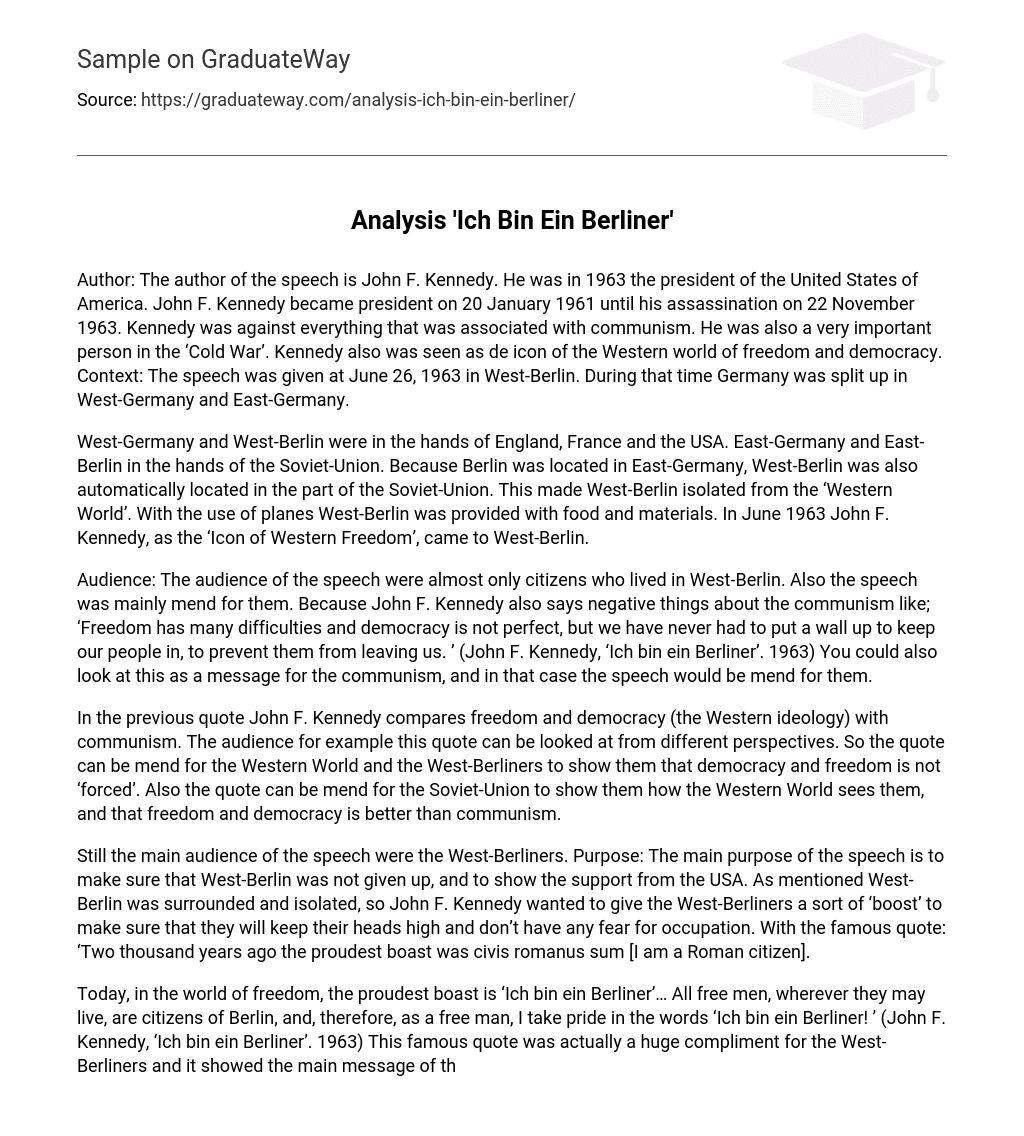Author: John F. Kennedy, the President of the United States of America in 1963, delivered this speech on June 26, 1963 in West Berlin. He held the presidency from January 20, 1961 until his assassination on November 22, 1963. Kennedy strongly opposed communism and played a significant role in the Cold War. Additionally, he was regarded as an emblem of freedom and democracy in the Western world.
Context: At that time, Germany was divided into West-Germany and East-Germany.
During the post-World War II era, West-Germany and West-Berlin were under occupation by English, French, and American forces. In contrast, East-Germany and East-Berlin came under Soviet control. Since Berlin was situated within the territory of East-Germany, West-Berlin became isolated from the Western World due to its proximity to the Soviet sphere of influence. However, essential supplies such as food and materials were delivered to West-Berlin through airlift operations. It is important to note that in June 1963, John F. Kennedy paid a significant visit to West-Berlin as a symbol of Western Freedom.
The main audience of John F. Kennedy’s 1963 speech was the citizens of West-Berlin. The speech primarily discussed the drawbacks of communism and highlighted that although freedom and democracy have their own difficulties, they never needed to build a wall to prevent people from leaving, unlike the communists. This message was relevant and applicable to both the citizens of West-Berlin and the communists.
John F. Kennedy’s previous quote draws a comparison between freedom and democracy, representing the Western ideology, and communism. This quote can be interpreted from various viewpoints. Firstly, it is meant for the Western World and West-Berliners to demonstrate that democracy and freedom are not imposed. Additionally, it is intended for the Soviet Union to elucidate how the Western World perceives them and to emphasize the superiority of freedom and democracy over communism.
The speech’s main audience consisted of West-Berliners, and its purpose was to reassure them that West-Berlin would not be abandoned and to demonstrate support from the USA. Because West-Berlin was surrounded and isolated, John F. Kennedy aimed to uplift the West-Berliners and alleviate their fear of occupation. He famously stated, “Two thousand years ago the proudest boast was civis romanus sum [I am a Roman citizen].”
In the world today, in a time of freedom, the proudest statement is ‘Ich bin ein Berliner’… All individuals who enjoy freedom, no matter their location, are citizens of Berlin. And as a free person, I take great pride in saying ‘Ich bin ein Berliner!’. This famous quote, spoken by John F. Kennedy in 1963, was a tremendous compliment to the people of West-Berlin, showcasing the central message of his entire speech – the United States’ support for a democratic West-Berlin.
Regarding the structure, I believe the speech is well organized. While not extensively long, it possesses great power and impact.
John F. Kennedy begins his speech by expressing his pride in being in the Federal Republic with the distinguished Chancellor of Germany, who has long been committed to democracy, freedom, and progress (‘Ich bin ein Berliner’, 1963). This introduction sets the tone for the rest of his speech, as Kennedy gradually delves into the main message he wishes to convey. The middle part of the speech commences after Kennedy utters the iconic words: ‘Ich bin ein Berliner’.
He begins by comparing freedom and democracy to communism. He then concludes by emphasizing the significance of his words: “All free men, wherever they live, are citizens of Berlin, and as a free man, I am proud to say ‘Ich bin ein Berliner!'” The speech effectively employs an introduction, body, and conclusion format to make a strong impression. However, it is crucial to acknowledge that Kennedy had to be careful in selecting his words due to the ongoing Cold War during that period.
Due to the tense relationship between the USA and the Soviet Union, Kennedy had to be cautious in avoiding any statements that could be seen as offensive and potentially trigger a war. In his speech, Kennedy expresses his reservations about communism without being too explicit. In terms of ethos, Kennedy’s position as the president of the USA lends credibility to his words, as he is expected to possess knowledge and a distinct perspective.
John F. Kennedy is considered an icon of freedom and democracy, as mentioned. Therefore, it is understandable when he declares, ‘You live in a defended island of freedom, but your life is part of the main.’ (John F. Kennedy. ‘Ich bin ein Berliner.’ 1963) The use of pathos is notable in his famous sentence ‘Ich bin ein Berliner,’ which evokes strong emotions and conveys a sense of power. Kennedy also discusses the hardships faced by husbands separated from their wives, families torn apart, and the lack of freedom to associate with whomever one desires.
Kennedy effectively uses emotional situations in his speech to generate empathy from his audience. The most logical aspect of the speech is when Kennedy discusses the utilization of a wall to prevent people from leaving the realm of freedom and democracy. This statement serves as a rebuttal to the Soviet-Union, highlighting the absurdity of erecting a barrier to restrict movement. Overall, Kennedy skillfully employs ethos, pathos, and logos throughout the speech, reinforcing their presence and impact at various points.





